The Man from Down Under

Brief Synopsis
Cast & Crew
Robert Z. Leonard
Charles Laughton
Binnie Barnes
Richard Carlson
Donna Reed
Christopher Severn
Film Details
Technical Specs

Synopsis
In Belgium, in 1919, Australian soldier Jocko Wilson celebrates the war's end by going to see his sweetheart, tempermental English entertainer Aggie Dawlins. That same day, Jocko sees a starving little boy fighting in the street and takes him and his little sister under his wing. When Jocko's leave is over, he realizes that he is too fond of the children to abandon them and so sneaks them aboard his ship. Jocko then asks Aggie to be the mother of his children, not explaining that the children already exist. Meanwhile, at the orphanage from which the children came, a friend of their late father explains that the children do not know, but the boy's father actually adopted the girl after her own parents had been killed. Later that afternoon, Jocko gets in a fight and lands in the brig before sailing, and Aggie is left single and fuming on the shore. Many years later, the boy, now called "Nipper," is a successful boxer and the devoted Jocko has made his Sidney pub a success. Convinced that Nipper can win the title "champion of the empire," Jocko takes on all bettors for the fight. That night, the girl, Mary, who has been away for years at an expensive boarding school, arrives for a happy reunion. At home, she is introduced to "Dusty" Rhodes, an American sports reporter and friend of Nipper, who is immediately attracted to her. Hoping to buy a place in the country, Jocko overextends his book, and when word gets out that he may welsh if Nipper loses, the bar patrons become rowdy. Nipper calms them by saying his earnings will cover the book, then secretly admits to Mary that only the winner's purse will be enough. Nipper badly injures his shoulder in the fight, and Jocko wants to throw in the towel, but Nipper refuses and wins. Later, the doctor tells Jocko that Nipper may never fight again because every ligament in his shoulder is torn, but Nipper vows that he will go to America to fight for the world championship. A worried Jocko temporarily dissuades him, however, by buying a hotel in the country. Several months later, Nipper has maintained his workouts with the assistance of his friend, Father Polycarp, and Jocko and Mary cannot convince him that his boxing career is over. Because of expenses and no customers, Jocko is having financial problems, and Mary suggests to Nipper that they go back to Sydney to find jobs. She wants to work in Dusty's office, but Nipper, who for no apparent reason is anxious over her romance with Dusty, is reluctant. One day, Aggie, who is now a rich widow, appears, pretending to have forgiven Jocko. Jocko decides to marry her to keep the hotel, but she knows about his financial problems and lures him into card and dice games until she eventually wins the hotel and hires him as its manager. Soon Dusty arrives before leaving for his new assignment in Berlin and asks Mary to go with him as his wife. She wants to go back to Europe to find out about her family, but turns him down because she does not love him and is so happy with Jocko and Nipper. When Nipper, who has been fighting his physical attraction to Mary, sees her kiss Dusty goodbye, he misunderstands and angrily slugs Dusty. The next day, Nipper apologizes to Dusty and shakes his hand, but cannot face the confused Mary. He then goes to see the sympathetic Fr. Polycarp, who has suspected Nipper's torment and offers him sanctuary at the monastery. A short time later, Nipper tells Jocko that he is retiring from the ring and plans to leave Australia. Mary and Jocko are both hurt and cannot understand what has happened. When Aggie goes to comfort Mary, she reveals that she has always felt safe with Nipper, but curiously has no memory of him from her early childhood. That night, Germany invades Poland and the British Empire goes to war. Jocko and his friend, Ginger Gaffney, decide to enlist and Jocko will not listen to Aggie's questions about how he met the children. Jocko is shattered when the army turns him down because of his health, but determines to be part of the war effort by doing whatever he can. Some months later, when the Japanese bomb Darwin in Northern Australia, children need to be evacuated south and Aggie and Mary turn the hotel into a shelter for displaced children. When Ginger is slightly wounded, he comes to the hotel looking for Jocko, not knowing that his friend had told Aggie and Mary that he was an army officer. Japanese bombing continues that night and the hotel suffers some damage. Jocko, who is working as a ditch-digger nearby, sees bombing near the hotel and rushes over. Just then, Nipper, back in Australia after being wounded, goes to the monastery and also sees the bombing. On his way to the hotel, his truck is hit by a bomber. Jocko finds the slightly wounded Nipper in the truck and the two head for the hotel, which has just been occupied by the crew of a downed Japanese plane. Nipper and Jocko successfully fight the Japanese and free Mary and Aggie. As Nipper and Mary embrace, Fr. Polycarp arrives with their birth certificates and other information from Belgium, confirming that they are not blood relations. Aggie then explains everything to Jocko, who gets a call from Brisbane asking him to report for duty as a captain in the militia. Jocko knows that Aggie has arranged this and as Mary and Nipper walk hand in hand in the garden, Jocko and Aggie embrace.

Director

Robert Z. Leonard
Cast
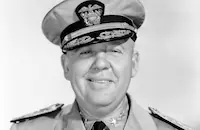
Charles Laughton

Binnie Barnes

Richard Carlson
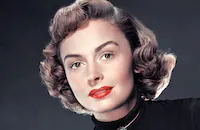
Donna Reed
Christopher Severn
Clyde Cook

Horace Mcnally
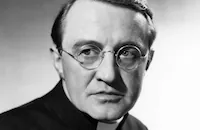
Arthur Shields
Evelyn Falke
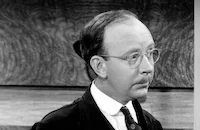
Hobart Cavanaugh
Andre Charlot
Raymond Severn
Bobbie Hale
Harold De Becker
Al Ferguson
Eddie Dew
Jimmy Aubrey
Luis Alberni
Ernest Severn

Ian Wolfe
Maurice Tauzin
Albert Godderis
Martha Bamattre
Frank Hagney
Fred Graham
Jack Stoney

Harry Warren
Wallis Clark
Kay Deslys
Ann Howard
Cynthia Randolph

Brandon Hurst
Lumsden Hare
Joe Hartman
Harry Fleischmann
David Thursby
Eric Alden

E. Mason Hopper
Rex Evans
Will Stanton

Harry Cording
George Magrill
Gibson Gowland

Freddie Steele

Charles Irwin
Art Foster
Charles Sullivan
Evan Thomas
Arthur Space

Eily Malyon
Hal Craig
Reginald Sheffield

Richard Ainley
Mary Mcleod
Dorothy Lawrence
Emerson Fisher-smith
Leslie Sketchley

Peter Lawford
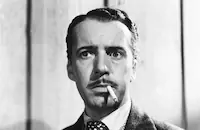
Boyd Irwin
Clancy Cooper
Leland Hodgson
George O'flaherty
Harry Allen
Pat O'malley
Luke Chan
Philip Ahn
Frank Tang
Beal Wong
Roland Got
Wing Foo
Robert St. Angelo
Ezra Paulette
Chris Frank
Harry Tozer
Pat Moran
Gil Perkins
Alfred Paix
Charles Bates
Gil Perkins
Nelson Leigh
Ted Billings
Charles Bimbo
Constance Weiler

Holmes Herbert
Elizabeth Williams
Florence Wix
Louise Bates
Catherine Wallace
Mickey Golden
George Levine
Joe Hickey
Rube Schaffer
Robert Tait
Clare Verdera
Ottola Nesmith
Jean Prescott
Crew
David W. Bailey
Glen Barner
Earl Brent
Jack Dawn
Orville O. Dull
Cedric Gibbons
Arnold Gillespie
Stephen Goossón
Major Sam Harris
Irene
Lon Jones
Mark Kelly
Robert Z. Leonard
Earl Mcevoy
Bogart Rogers
Wells Root
Thomas Seller
Douglas Shearer
David Snell
Gile Steele
Walter Strohm
Elmo Veron
Sidney Wagner
George White
Edwin B. Willis

Film Details
Technical Specs

Articles
The Man From Down Under
And yet, and yet. No movie with the services of Laughton, Reed, Carlson, Binnie Barnes, and Arthur Shields can be entirely without charm, and this amiable comedy-drama about war, boxing, romance, orphans, and the hotel business holds up reasonably well. The principals put considerable zest into their performances, and producer-director Robert Z. Leonard keeps the action moving at a steady pace, if not exactly a galloping one. There's added interest if you bear in mind the film's 1943 production date and read it as one of MGM's contributions to the morale-boosting effort during World War II, in which many Australians patriotically served.
The story begins near the end of World War I at a French embarkation point, where Sergeant Jocko Wilson is about to head home for Australia, partly to regain a normal life and partly to get away from Aggie Dawlins, a fiancée he doesn't want to marry. Just before boarding his ship he meets two orphaned Belgian kids; his heartstrings stretch to the breaking point, and he impulsively decides to adopt them. Flourishing in their new Australian home, little Mary and "Nipper" happily grow up. Mary, played by Reed, becomes a lovely young woman with a finishing-school education, and Nipper, played by Carlson, becomes such a skilled boxer coached by Jocko, once a pugilist himself that he wins the Australian lightweight title. Nipper gets sidelined when he injures a shoulder in a fight, but Jocko has already made a pile by betting on the championship match, and he uses the money to open a hotel, guaranteeing a secure future for all concerned.
Or so it seems, until Aggie turns up again. Determined to get even with Jocko for leaving her in the lurch twenty years ago, she inveigles him into a gambling spree, winning all his money and even his beloved hotel. In addition to this crisis, Nipper and Mary have been experiencing romantic attraction toward each other an awkward turn of events, since they are brother and sister. Could things get any worse? Yes indeed: World War II breaks out, and a few plot twists later the characters are in imminent danger of a Japanese attack. This gives Jocko a chance for some unexpected heroics, after which the couples of the story are properly paired off, including Nipper and Mary, who (surprise!) aren't related to each other after all.
Laughton used to say that his face resembled an elephant's backside or a pudding, and biographer Callow has called it "the face of someone who simply shouldn't be an actor at all." He became a remarkable actor all the same, despite (or because of) his unlikely looks, and if he seems too pudgy and ungainly for Jocko's wartime heroics to seem credible, it's interesting to recall that Laughton himself did front-line combat in World War I, suffering permanent damage from a gas attack less than a week before the conflict ended. In my view, the two chief factors behind Laughton's great success were his commanding presence, made all the more imposing by his somewhat oversized body, and the total control he exercised over his expressive face, which could leap through a gamut of subtle emotions with a minimum of noticeable effort. Even his talents weren't enough to make Jocko a memorable character, however. Writing that "for once in his life Mr. Laughton is giving a performance that is simply ordinary," New York Times reviewer Theodore Strauss diplomatically suggested that Laughton might be doing a lackluster job on purpose, hoping to signal his dim view of the "naïvetés" of the story he was stuck in. But the respected British critic Caroline Lejeune was less gentle: "One of the most painful screen phenomena of latter years," she wrote, "has been the decline and fall of Charles Laughton from the splendid actor of The Private Life of Henry VIII [1933], Mutiny on the Bounty [1935] and Rembrandt [1936], to the mopping and mowing mug in The Man from Down Under."
According to Reed biographer Brenda Scott Royce, a film archivist once used "the last name of the coproducer, Orville O. Dull," to describe the overall effect of The Man from Down Under. But responsibility for the dullness must lie with director Leonard, who evidently wasn't paying full attention to the project allowing the actors to slip in and out of Australian accents any time they chose, for instance, and not noticing (or not caring) when they gave up the effort altogether. Still, when viewed in the proper frame of mind a forgiving frame of mind the movie is more fun than 1940s reviews indicate. Laughton hams it up for Leonard the way he did for, say, Alfred Hitchcock in Jamaica Inn [1939], and the fun he's having is infectious in a corny kind of way. Reed looks so relaxed and graceful that you'd never guess she turned out four pictures in 1943, and Carlson, who turned out five, is thoroughly likable, if too unmuscular to pass for the lightweight champion of Australia, or of anywhere. Barnes wrestles valiantly with the role of Aggie, whose personality changes so much during her twenty-year absence that I had trouble recognizing her when she reappeared, but Shields is just right as Father Polycarp, a priest who helps pave the way for the happy ending. One of the film's most favorable reviews was in Variety, which commended it for "verve and unusual dramatic angles" as well as "skillful direction...deft writing, and excellent performances." I don't think many viewers would praise the picture so highly now, but you'll have a good time if you enjoy watching first-rate actors in a minor entertainment that makes up in high spirits what it lacks in common sense.
Producers: Robert Z. Leonard and Orville O. Dull
Director: Robert Z. Leonard
Screenplay: Wells Root and Tom Seller, based on the story by Bogart Rogers and Mark Kelly
Cinematographer: Sidney Wagner
Film Editing: George White
Art Direction: Cedric Gibbons
Music: David Snell
With: Charles Laughton (Jocko Wilson), Binnie Barnes (Aggie Dawlins), Richard Carlson ("Nipper" Wilson), Donna Reed (Mary Wilson), Christopher Severn ("Nipper," as a child), Clyde Cook (Ginger Gaffney), Horace McNally ("Dusty" Rhodes), Arthur Shields (Father Polycarp), Evelyn Falke (Mary, as a child), Hobert Cavanaugh ("Boots"), Andre Charlot (Father Antoine).
BW-103m.
by David Sterritt

The Man From Down Under
Quotes
Trivia
Notes
According to pre-production news items, producer William Cagney and his brother, actor James Cagney, were interested in purchasing the original Bogart Rogers-Mark Kelly story for their own company as a starring vehicle for James. When M-G-M bought the property, they intended to co-star Wallace Beery and Gracie Fields as "Jocko Wilson" and "Aggie Dawlins." Later, Blanche Ring was considered for the role of Aggie, and Van Johnson was considered for the role of "Nipper" as an adult. News items include Arthur Stenning, Carol Lou Nugent, Naomi Scher and David Shurian in the cast, but their appearance in the released film has not been confirmed. One news item mentioned that "the four Severn boys," Christopher, Ernest, Raymond and Clifford, would portray Nipper at four different ages, but only Christopher and Raymond portrayed Nipper. Ernest had another small role in the film, but Clifford's appearance has not been confirmed. Elmo Veron is listed in one Hollywood Reporter news item and on early Hollywood Reporter production charts as the film's editor, but only George White is credited onscreen and in reviews. According to Hollywood Reporter news items, Charles Laughton suffered a knee injury during a fight scene and was off the production for about two weeks.
While the film's plot concerns possible incestuous feelings of "Nipper" for "Mary," the word incest was not used in the film or in reviews. The PCA file on the film, in the AMPAS Library, indicates that the script and film were accepted without elimination, although it was suggested by the PCA that some lyrics of the song "E Pinched Me" should be changed to make it less "vulgar." The PCA file also reveals that another song was written for the film by Earl Brent, "Three Little Birds in a Blue Gum Tree," but that song was not in the released film.















